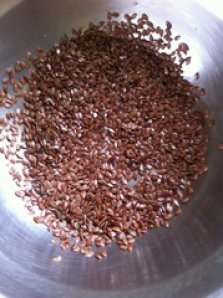
Source: Jamican Cookery- https://www.jamaicancookery.com/2017/02/celery-healthy-drink-recipe.html
Flax seed is called linseed in Jamaica. Flax seed comes from the flax plant, which is an annual herb. In the past, flaxseed was used mostly as a laxative. The ancient Egyptians used flaxseed as both food and medicine.
Flax seed is high in fibre and contains a gummy material called mucilage, both of which expand when they come in contact with water. They add bulk to stool and help it move more quickly through the intestines.
Flax seed may help prevent and treat of the following health conditions:
High cholesterol: flax seed and flax seed oil have been reported to lower cholesterol. People who eat a Mediterranean diet tend to have higher HDL (good) cholesterol levels. The Mediterranean diet includes whole grains, root and green vegetables, fruits, fish and poultry, olive and canola oils, and ALA from flaxseed, flaxseed oil, and walnuts. It limits the amount of red meat, butter, and cream you eat. flaxseed and flaxseed oil have been reported to lower cholesterol.People who added flaxseed to a low-cholesterol diet lowered their LDL (bad) cholesterol and triglyceride levels (fats in the blood).
Heart disease: A diet rich in fruits, vegetables, whole grains, nuts or legumes, and foods with ALA may reduce the risk of heart attack and stroke, both for people who have never had either problem and for those who have already had a heart attack or a stroke. One of the best ways to help prevent and treat heart disease is to eat a diet low in saturated fat and trans fat, and eat foods that are rich in monounsaturated and polyunsaturated fats, including omega-3 fatty acids from flaxseed. Evidence suggests that people who eat an ALA-rich diet are less likely to have a fatal heart attack.
Several human studies suggest that a diet rich in omega-3 fatty acids (including ALA) may lower blood pressure in people with hypertension.
Breast cancer: Flaxseed contains phytoestrogens, which are plant chemicals called lignans. Because lignans may act like oestrogen in the body, scientists aren't sure whether flaxseed would be harmful or helpful for breast cancer. Studies have reported that flaxseed reduced breast tumour growth and metastasis (spreading) in rats.
There has been only one clinical study in humans. In that study, postmenopausal women who were newly diagnosed with breast cancer ate a muffin with 25 grams dietary flaxseed every day for 40 days. The study found that adding flaxseed to the diet may have the potential to reduce tumour growth in women with breast cancer. More research is needed.
Colon cancer: Animal studies show that lignans may slow the growth of colon tumour cells. Population studies suggest that flaxseed may reduce the number of abnormal cell growths, which are early markers of colon cancer. Clinical trials in people are needed, however.
Prostate cancer: Results from studies are confusing when it comes to prostate cancer and flaxseed. A few studies seemed to show that ALA intake was associated with an increased risk for prostate cancer. But other studies have found that flaxseed may benefit men at risk for prostate cancer. In one study, men with a precancerous prostate condition called PIN had lower PSA levels (a marker of prostate cancer) when they ate 30 g of flaxseed daily along with a low-fat diet. In men who had prostate cancer, 30 g of flaxseed daily and a low-fat diet did not lower PSA levels. But it did appear to lower levels of testosterone and slow down the rate of tissue growth. More studies are needed to understand how flaxseed may affect prostate cancer.
Other uses: Researchers are investigating whether omega-3 fatty acids may help protect against certain infections and in treating conditions including ulcers, migraine headaches, attention deficit/hyperactivity disorder (ADHD), addiction, eating disorders, preterm labour, emphysema, psoriasis, glaucoma, Lyme disease, lupus, and panic attacks.
Flax seed description: Flax is an annual plant that thrives in deep moist soils rich in sand, silt, and clay. The small, oval-shaped seeds of the flax plant contain oil, sometimes called linseed oil.
Flaxseed has several plant chemicals that may be healthy, including:
Fibre, both soluble and insoluble
Protein
Essential fatty acids (ALA)
Lignans
Flaxseed acts like a laxative because of its fibre and mucilage content.
The health benefits of flaxseed, such as protection from heart disease and arthritis, are probably due to a high concentration of the omega-3 fatty acid ALA.
In addition to the important omega-3 fatty acid ALA, flaxseed, NOT the oil, also contains phytoestrogens, which are plant chemicals called lignans. Phytoestrogens act like the hormone oestrogen and may help protect against some kinds of cancer.
Available Forms
Flaxseed oil should be refrigerated. Use whole flaxseeds within 24 hours of grinding, otherwise the ingredients lose their activity. Flaxseeds are also available ground in a special mylar package so that the components in the flaxseeds stay active. Ripe seeds, linseed cakes, powder, capsules, and flaxseed oil are all available at health food and grocery stores.
Flaxseed oil may be added to a child's diet to help balance fatty acids.
Children (2 to 12 years old): Ask your doctor to help you determine the right dose.
Adult
Grind before eating and take with lots of water.
Warning: unripened flax seeds are poisonous; can cause nausea, diarrhoea, and gas.
Overuse flax seeds cause: weakness, dyspnoea, tachypnea, paralysis, convulsions, and death.





